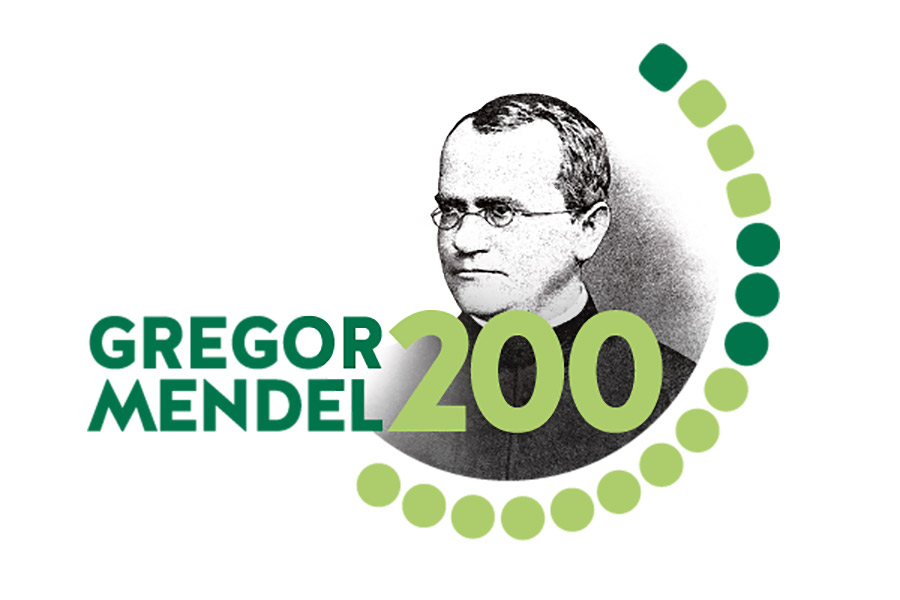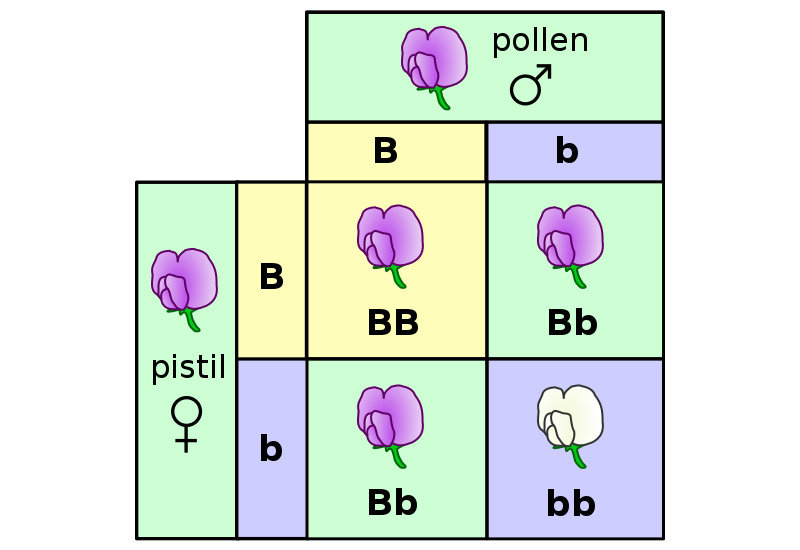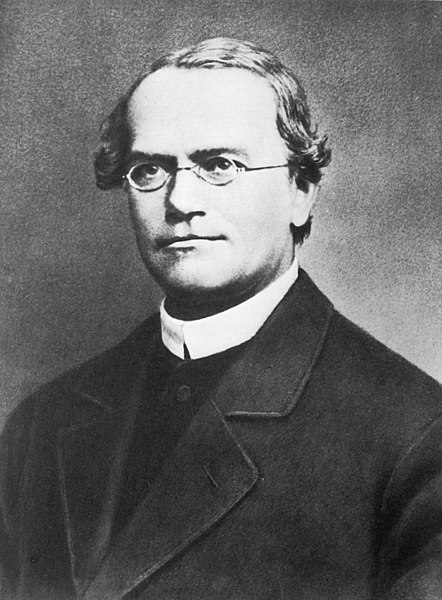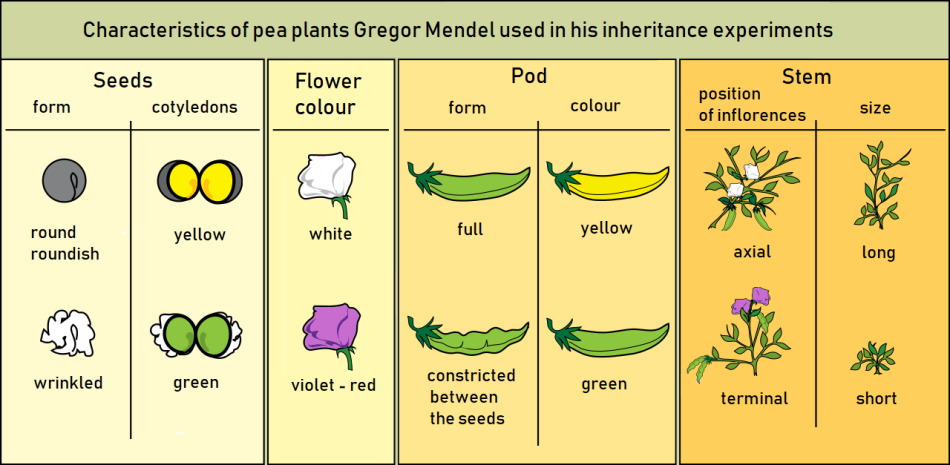Celebrating Gregor Mendel in his 200th anniversary year Inspire article
Europe is throwing a party for Gregor Mendel. Cities and institutes in Austria, the Czech Republic, Germany, and the United Kingdom invite you to a year of events honouring the father of genetics.

Although the results of Gregor Mendel’s experiments on plant cross-breeding and heredity are well known, his life as a student, monk, and citizen are not found in text books. On the 200th anniversary of his birth, Interreg is funding a cross-border campaign to promote the legacy of Gregor Mendel’s contribution to science, culture, and humanity. The purpose of this article is to whet your appetite by presenting a vignette of Mendel’s life with information gathered by researchers and historians during events for this year’s 200th anniversary. Later, you will find a travel guide to the anniversary celebrations.
Why are we celebrating Gregor Mendel?
Students usually discover Gregor Mendel’s work in biology classes and learn to fill out Punnett Squares, which visually represent Mendel’s Laws of Heredity by using a coordinate system to predict the probability of offspring having a certain genotype.

Image: Madeleine Price Ball/Wikipedia,
Public Domain
- Gregor Mendel was the first to discover that organisms have different heritable traits. He discovered this by studying pea plants.
- Over the course of his life as a botanist, teacher, and monk, Mendel grew and tested almost 30,000 pea plants.
- He discovered the basic principles of heredity and laid the foundations for the science of genetics.
- Mendel’s revolutionary findings were largely ignored until after his death.
For example, Mendel’s rules were applied to the selective breeding of rapeseed. Rapeseed oil was originally a bitter lamp oil. It was not until the 1970s that it became possible to breed rapeseed varieties that gave oil suitable for cooking. This required several steps over many years until the plants produced oil with a mild flavour and good yields.
The Gregor Mendel Institute has made an animated short film to explain the key features of his work.
The Story of Gregor Mendel
At the age of 21, Gregor Mendel entered the monastery for financial reasons. Administering last rites to the sick and dying spread infectious diseases to clergymen, so there was a shortage of priests. Consequently, Mendel was ordained by the church before completing his theological studies. However, at the age of 26, he was relieved of his duties due to the mental and physical toll it took on him.
Between 1851 and 1853, Mendel went to Vienna because he had been teaching at a grammar school in Znojmo and ministerial regulations required that he obtain a university education. When he arrived in Vienna, Mendel took a teacher certification exam but performed poorly on the natural history section. Despite this setback, Mendel pursued a scientific education at the University of Vienna, enrolling in physics, biology, mathematics, and chemistry. He conducted his own experiments, trained in microscopy, and studied the anatomy and physiology of plants.

Image: Unknown author/Wikipedia,
Public Domain
The faculty may not have validated his teaching goals, but they certainly inspired his future research. Mendel took his mathematical training from Christian Doppler’s physics course (yes, the Doppler known for the Doppler Effect) and applied it to his biological experiments. The botanist Franz Unger taught Mendel about the evolutionary history of plants, which the bishop of Brno, who agreed to Mendel’s studies, may not have been too pleased about. His colleague, the philosopher František Matouš Klácel, later referred to him as “his free-thinking friend”, so perhaps Mendel fit right in. After his return to Brno and the Augustinian monastery, Mendel pursued his scientific interests. With its garden and high brick wall, the monastery offered Mendel an ideal location for his research on pea plants. In 1861, as a founding member of the Nature Research Society, Mendel found a place to discuss his findings and publish at an international level. Even flower exhibitions at the town hall took on special significance as a showcase for promoting new breeding developments to small farmers. Mendel’s evolutionary lines of hybrids provided a scientific basis for the selection of the most suitable plant species for growing crops.

In 1865, Mendel published the results of his experiments with plant hybrids: “Experiments on Plant Hybridization”. Although it is commonly noted that the scientific community disregarded his findings until after his death, the Pomological, Vinicultural, and Horticultural section of the Nature Research Society recognized that his experiments heralded new era of science. Later, his teachers in Vienna would officially rediscover and promote his findings on heredity.
Mendel was very human, a man who experienced financial hardship, who enrolled in everyday university courses, and who made significant contributions to science from a humble setting. By the end of his life, at the age of 62, Gregor Mendel had collected a number of prominent titles. He was abbot of his parish, a teacher of natural history (despite failing his exam), director of the Moravian Mortgage bank, vice president of the Nature Research Society, and chief judge of flower exhibitions.
A guide to the celebrations
The anniversary programming this year includes a new statue in Brno, work on his manuscripts, the restoration of his greenhouse, conferences, festivals, theatrical performances, an art competition, a quiz raffle for a pair of Apple Airpods, and guided tours. For more information about any of these events, please go to the Gregor Mendel 200 website.
18 June – Open Day IPK Gatersleben
The Institute of Plant Genetics and Crop Plant Research (IPK) in Leibniz, Germany, is running an Open Day dedicated to the 200th birthday of Gregor Mendel. The event will include various themed tours and talks, including a lecture by keynote speaker Prof. Dr. Uwe Hoßfeld, who will give insight into current Mendel research. They will honour the “father of genetics” and reflect on the impact of his work on their own research.
20-24 July – The Mendel Festival
The Mendel Festival runs the week of Mendel’s birthday in Brno, Czech Republic. The celebration includes a series of exhibitions in the Augustinian Abbey in Brno, from concerts to Mendel’s favourite food, with free entrance. One of the highlights of the celebrations will be a gala concert by the Brno Philharmonic Orchestra and the Czech Philharmonic Choir on Friday 22 July 2022.
17 September – BIOTOPIA Lab at the Botanical Garden
In cooperation with BIOTOPIA, Museum Mensch und Natur, and the Museumspädagogisches Zentrum, the Botanical Garden Munich-Nymphenburg will offer all visitors a colourful and diverse program relating to Gregor Mendel, who laid the foundation for a new branch of biology with his experiments with peas. In the BIOTOPIA Lab’s “The Code of Life” workshop, visitors can isolate the DNA of a banana, learn about the building blocks of their own life, and enter the world of genetics.
Recording Mendel’s Legacy
The Gregor Mendel Institute is sharing both news of the 19th century biologist’s life and current research in Mendel-related fields through a website developed for the anniversary year. For example, you can learn about Mendel’s life and work, join a virtual tour of Mendel’s Vienna, or share your own recollections about Mendel. There is also a grow your own peas project, with resources for getting involved by growing and cross-breeding your own pea plants. Future expansions of the website will include content from the year’s events and a virtual tour from Brno, where Mendel lived. For more information, see the Gregor Mendel 200 website or follow the official twitter account.
Resources
- Learn how Mendel came to be called the father of genetics.
- Read about how Mendel’s ideas were developed by later scientists and reshaped by new discoveries to give today’s understanding of inheritance.
- Take a look at this fantastic Twitter thread on the long road to recognition for Mendel’s work.
- Watch an interesting lecture on the work of Gregor Mendel and his colleague Cyrill Napp from a history of science perspective.
- Watch a lecture on Mendel’s time in Vienna and how his studies there influenced his later work.
- Try this classroom activity for introducing younger students to Mendelian inheritance using pompoms.
- Listen to some interesting podcasts about Mendel and his work:
- Hear about how Gregor Mendel’s book on sweet peas changed the face of biology.
- Discover Mendel’s experiments.
- Learn the three Mendelian laws.
- Understand the significance of Mendel’s work and how he went about his initial research.
- Read about how some researchers are bringing to light the medicinal wisdom of the Middle Ages: Watt S, Hayes E (2013) Monastic medicine: medieval herbalism meets modern science. Science in School 27: 38–44.
- Learn how to make statistical evaluations to measure plant growth: Brown J, Karamurzina S, Zharylgasin S (2020) Grow your own statistical data. Science in School 50.
- Learn how new species emerge: Bryk J (2018) Evolution in action: from genetic change to new species. Science in School 44: 8–14.
- Investigate the factors affecting plant growth and devise a plan for growing plants on the Moon: Hardie K, Cardoso C (2020) Astrofarmer: how to grow plants in space. Science in School 49: 33–37.
- Discover how the plant internal ‘clocks’ help them to respond to changing day-night cycles: Hubbard K (2019) How plants beat jet lag. Science in School 48: 8–11.
- Encourage students to explore the principles of form and function in relation to evolutionary adaptation by engaging with biomimetic design: Toro S (2021) Biomimicry: linking form and function to evolutionary and ecological principles. Science in School 53.





